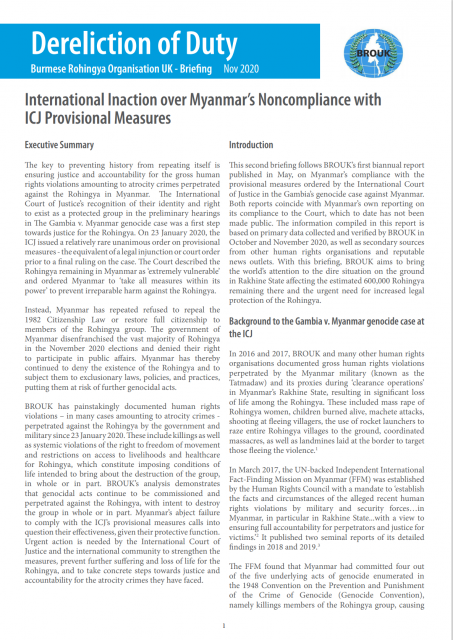Dereliction of Duty: International Inaction over Myanmar’s Noncompliance with ICJ Provisional Measures


Executive Summary
The key to preventing history from repeating itself is ensuring justice and accountability for the gross human rights violations amounting to atrocity crimes perpetrated against the Rohingya in Myanmar. The International Court of Justice’s recognition of their identity and right to exist as a protected group in the preliminary hearings in The Gambia v. Myanmar genocide case was a first step towards justice for the Rohingya. On 23 January 2020, the ICJ issued a relatively rare unanimous order on provisional measures – the equivalent of a legal injunction or court order prior to a final ruling on the case. The Court described the Rohingya remaining in Myanmar as ‘extremely vulnerable’ and ordered Myanmar to ‘take all measures within its power’ to prevent irreparable harm against the Rohingya.
Instead, Myanmar has repeated refused to repeal the 1982 Citizenship Law or restore full citizenship to members of the Rohingya group. The government of Myanmar disenfranchised the vast majority of Rohingya in the November 2020 elections and denied their right to participate in public affairs. Myanmar has thereby continued to deny the existence of the Rohingya and to subject them to exclusionary laws, policies, and practices, putting them at risk of further genocidal acts.
BROUK has painstakingly documented human rights violations – in many cases amounting to atrocity crimes – perpetrated against the Rohingya by the government and military since 23 January 2020. These include killings as well as systemic violations of the right to freedom of movement and restrictions on access to livelihoods and healthcare for Rohingya, which constitute imposing conditions of life intended to bring about the destruction of the group, in whole or in part. BROUK’s analysis demonstrates that genocidal acts continue to be commissioned and perpetrated against the Rohingya, with intent to destroy the group in whole or in part. Myanmar’s abject failure to comply with the ICJ’s provisional measures calls into question their effectiveness, given their protective function. Urgent action is needed by the International Court of Justice and the international community to strengthen the measures, prevent further suffering and loss of life for the Rohingya, and to take concrete steps towards justice and accountability for the atrocity crimes they have faced.

